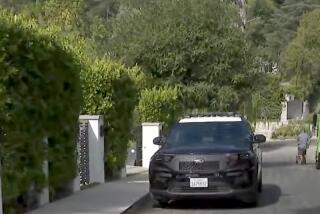Volunteers to Play Sleuths in Minor Crimes
Tustin police have enlisted a crew of volunteer citizens to probe deeper into minor unsolved crimes and to offer victims emotional support during the investigation.
The specially trained volunteers will call victims of petty crimes, from car and home burglaries to bicycle thefts, to see if they have any new information to provide since they last spoke to police. Victims will also get the chance to ask questions, discuss their fears and learn about neighborhood watch groups and crime prevention programs in their area. Police expect the volunteers to start making calls within a couple of months, said Sgt. Mike Pettifer, head of the program.
Typically, such minor crimes have no leads and little chance of being solved, Pettifer said. But sometimes victims remember important details weeks after they’ve reported the crime.
Volunteers may be able to gather this new information by talking one-on-one with the victims, a luxury not afforded to time-crunched investigators, he said.
The smallest detail--from discovering more missing items in a theft to finding a neighbor who saw a suspicious car near the crime scene--could make a difference, Pettifer said.
“We hope by making that personal communication, we’ll get some information we normally wouldn’t get,” he said. The victims “will have the chance to have a dialogue rather than just one-way communication.”
Although the department has no official start date for the program, officers are preparing scripts for volunteers to use. Any information the volunteers gather during the phone calls will be forwarded to investigators. The department expects the volunteers to make about 40 calls a month.
Garden Grove police have had a similar program for the last six years, said Cindy Nagamatsu-HanlonCQ, community liaison. In that time, Hanlon estimates that volunteers have made thousands of calls, many to people who just need someone to lend an ear.
Often, investigators are able to pinpoint crime trends, like a rash of home burglaries in a particular neighborhood, by reading the volunteers’ logs, Hanlon said. She added that although there is no record of crimes being solved because of the volunteers’ work, their contribution cannot be minimized.
“Sometimes [the volunteers] spend extra time talking to seniors, who are often alone and afraid, or to single moms,” she said.
Pettifer does not expect a significant increase in the number of minor crimes that are solved, but he hopes that the personal phone calls will add a human element to the typically sterile process in which crime victims only receive a generic letter sent to their homes, he said.
“People enjoy having personal contact with somebody, rather than a cold letter,” he said.
The volunteer program is an offshoot of the Tustin Police Citizens Academy, which gives residents an inside look at how the Police Department works. About 10 people lend time at the station, doing such tasks as filing records and fingerprinting people.
For Tustin volunteer Robert Dorn, the prospect of personally calling crime victims brings a new dimension to the job. “We want to be donating time, but we want to feel useful doing it, rather than just filing and doing paperwork,” he said.
Ordinary citizens, he added, may have an advantage over police officers in talking to people who have been burglarized. “We have a lot of empathy, and we’re probably more inclined to spend more time on the small details,” he said.
Renee Moilanen can be reached at (714) 966-4674.
More to Read
Sign up for Essential California
The most important California stories and recommendations in your inbox every morning.
You may occasionally receive promotional content from the Los Angeles Times.










